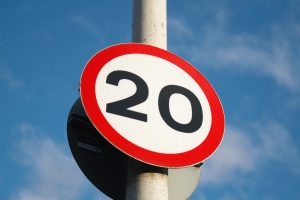
Road safety is everyone’s responsibility, because for the majority of people living in Great Britain the car is an inherent part of their daily lives. But as drivers who make their living by being on the road, (1 in 10 British workers use a van for their livelihood) you should be even more committed to these important road safety messages.
In the last few years, the number of road accidents in the UK has been averaging over a hundred thousand annually. Every time we’re on the road we need to consider what speed is appropriate to keep ourselves and others safe. That is the remit of Road Safety Week, which is the UK’s biggest road safety event, coordinated annually by Brake, the road safety charity. Road safety weeks are an annual event started in 1997, with the aim of raising awareness around road safety.
Someone is injured on a UK road every four minutes. Whilst the most common cause of accidents is to driver error, vehicle speed plays a part in every crash, which is why this year’s road safety campaign has the message there is “No Need to Speed”.
NO NEED TO SPEED
The rationale is simple- the higher the speed, the longer the stopping distance, the harder the crash and the greater the risk of death and injury. No Need to Speed is a reminder to everyone of how the speed they travel affects other people. Road crashes are one of the biggest causes of death and serious injury among children and young people. Every 20 minutes, someone is killed or seriously injured on a British road.
The impacts of driving too fast go far
It’s not just accidents either. It’s also about community responsibility too. Dangerous roads also affect people’s ability to walk, cycle and live healthy active lifestyles. Speed Down doesn’t only save lives, but it improves lifestyles, communities and the environment. It also impacts on sustainability and fuel consumption.
Not only do road accidents cost the driver, but they are costly to the people involved in the crash, insurance companies, emergency service units and local councils. Vehicle accidents also cause traffic disruptions and emotional distress if there are any fatalities or injuries.
Road Safety Week is an ideal opportunity to demand safer streets in your community and for commercial fleet operators, a chance to show that you are a responsible employer that puts people first.
You can sign up to take part in the UK’S biggest road safety campaign here.
The Commercial Fleet Perspective
According to Department of Transport data1, there are now 4.6 million light commercial vehicles (LCV) on the road in Britain. As already noted, without the van, one in 10 British workers would not be able to carry out their work.
Statistics from Statista Research Department2 from 2017, the latest available data, shows that Light Goods Vehicles account for around 10% of all road vehicles. In the same research, of all vehicle types observed from a road traffic violation survey, LGV’s were caught exceeding the speed limit most frequently on 30 mile-per-hour speed limit roads than any other vehicle, with 4 am being the most common hour of the day.
Every MPH Counts
Now, granted, exceeding a 30 mile an hour limit may not seem much, but in a crash, even 1mph can mean the difference between life and death. Combine that with the fact that the increase in the number of home- workers and lockdown creating a surge in on-line shopping, the pressures on courier drivers and fleets to get van drivers from A to B is likely to continue growing. This pressure may result in not taking the necessary breaks, driving tired and/or speeding.
Yes, time is money, but it should never be at the risk of causing accidents.
The HGV impact
Conversely over half a million Heavy Goods Vehicles (HGV) thunder up and down our 262,300 plus miles of UK roads, according to the Continuing Survey of Roads Goods Transport (CSRGT). However, HGV’s only account for around 6 % of road traffic accidents4.
That said, although HGV crashes make up a small percentage of total road accidents, they are usually the most serious. The size and weight of these vehicles, not to mention the added mass of goods in transit, makes them extremely dangerous in the event of a collision. Research4 shows that 24% of injuries from HGV crashes are severe or fatal, so this campaign is aimed at HGV drivers too.
Speed statistics from the DoT
Using the latest statistics from the Department of Transport, speed related accidents across all vehicle types that occurred in Britain break down as ;-
- Driver was careless, reckless or in a hurry – 17,845 accidents reported
- Driver was travelling too fast for conditions – 6,468 accidents reported
- Driver was exceeding speed limit – 5,102 accidents reported
The Costs of accidents are more than financial
So, get onboard with this road safety campaign, slow down and drive carefully.
Register for Road Safety Week 2020 and you’ll get a free, online action pack, full of advice, ideas and activities to help you get involved.
2 https://www.statista.com/statistics/633266/gb-exceeded-speed-limits-30-mph-roads-vehicle-type/
4 Department of transport
